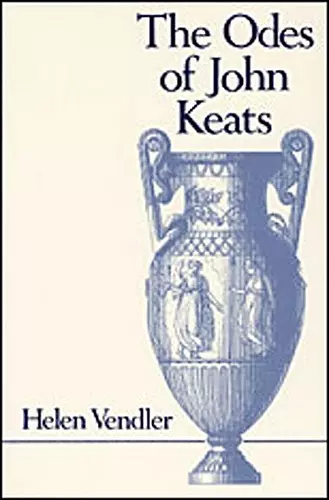The Odes of John Keats
Format:Paperback
Publisher:Harvard University Press
Published:14th Apr '85
Currently unavailable, and unfortunately no date known when it will be back

“Simply superb.”
—The Nation
A landmark study reconstructs the magnificent architecture of Keats’s odes beam by beam.
With the exception of Shakespeare, John Keats has garnered more critical attention than probably any other English poet, above all for his six great odes. Composed in the span of just a few months in 1819, the odes mark the high point of Keats’s all-too-short literary career, forming, as Helen Vendler puts it, “the group of works in which the English language finds an ultimate embodiment.”
Even with the mountain of criticism that precedes it, The Odes of John Keats nonetheless accomplishes something bracingly new: it reveals that the odes, typically read separately, demand to be read as a unified whole. Only when we read them together, Vendler argues, do we see how each ode builds upon, and contradicts, the one that came before it—a progression that expresses Keats’s sustained and deliberate inquiry into nature of creativity itself. From fruitless revery in “Ode on Indolence,” to successive explorations of music and mimetic art in “Ode to a Nightingale” and “Ode on a Grecian Urn,” to the final triumph of lyric poetry in “To Autumn,” each ode advances tentative theses about the relationship between truth, beauty, and sensory experience, only to subsequently overturn them from a higher vantage point.
Exquisitely attentive to the warp and weft of Keats’s “many languages,” from Greek mythology to eighteenth-century allegory, Vendler’s architectonic reading masterfully achieves criticism’s highest aim: keeping these classic poems, to borrow Keats’s own words, “forever warm and still to be enjoy’d.”
Vendler’s study of the odes is as sympathetic, as fundamentally Keatsian, as it is persuasive. It contains the fullest and most searching expansion of these six poems…that has yet appeared. -- John Bayley * Times Literary Supplement *
[Vendler] is often described as the best living American ‘close reader’ of poetry, and rumors of a forthcoming book on Keats have aroused expectations of pleasure such as are not always to be detected when a professor announces a book on a poet. She has met this new challenge with her usual admirable vigor and confidence… She is a virtuoso. -- Frank Kermode * New York Times Book Review *
Helen Vendler’s readings of Keats’s major poems are simply superb. * Nation *
[A] scrupulous and sensitive exploration of Keats’ odes… Treating the odes as a unit is not new, but Vendler uses them with new-minted relevance to reveal the development of Keats’ creative mind. She is our finest close reader of poetry, and page after page brims with the excitement of the poet’s intellectual and artistic discoveries… When you finish this book, you don’t reach an end; you understand why Keats made or did not make the choices he did; and you are compelled to go back and reconsider these complex relationships, both in the criticism and the odes… The prose brilliantly illumines the mind and art of Keats. -- Robert Taylor * Boston Globe *
Every rift of [Vendler’s] book is loaded with critical ore, stimulating ideas of all sorts, and throwing off suggestions that join up with others already in the mind. To do justice to her book a commentary on it would have to be as long as itself, for every point she makes on Keats’s lines are, like the lines themselves, both solution and problem. -- John Bayley * Studies in Romanticism *
ISBN: 9780674630765
Dimensions: 229mm x 147mm x 23mm
Weight: 454g
344 pages